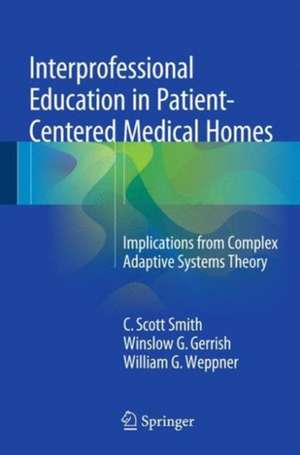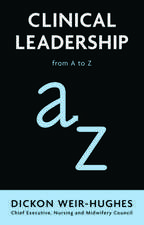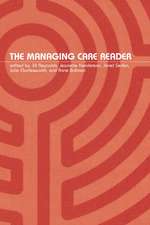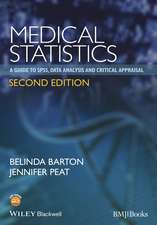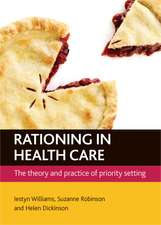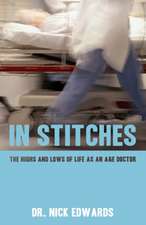Interprofessional Education in Patient-Centered Medical Homes: Implications from Complex Adaptive Systems Theory
Autor C. Scott Smith, Winslow G. Gerrish, William G. Weppneren Limba Engleză Hardback – 8 sep 2015
| Toate formatele și edițiile | Preț | Express |
|---|---|---|
| Paperback (1) | 509.03 lei 38-44 zile | |
| Springer International Publishing – 22 oct 2016 | 509.03 lei 38-44 zile | |
| Hardback (1) | 777.91 lei 22-36 zile | |
| Springer International Publishing – 8 sep 2015 | 777.91 lei 22-36 zile |
Preț: 777.91 lei
Preț vechi: 818.85 lei
-5% Nou
Puncte Express: 1167
Preț estimativ în valută:
148.85€ • 155.83$ • 123.17£
148.85€ • 155.83$ • 123.17£
Carte disponibilă
Livrare economică 17-31 martie
Preluare comenzi: 021 569.72.76
Specificații
ISBN-13: 9783319201573
ISBN-10: 3319201573
Pagini: 118
Ilustrații: IX, 118 p. 6 illus., 1 illus. in color.
Dimensiuni: 155 x 235 x 15 mm
Greutate: 0.4 kg
Ediția:1st ed. 2015
Editura: Springer International Publishing
Colecția Springer
Locul publicării:Cham, Switzerland
ISBN-10: 3319201573
Pagini: 118
Ilustrații: IX, 118 p. 6 illus., 1 illus. in color.
Dimensiuni: 155 x 235 x 15 mm
Greutate: 0.4 kg
Ediția:1st ed. 2015
Editura: Springer International Publishing
Colecția Springer
Locul publicării:Cham, Switzerland
Public țintă
Professional/practitionerCuprins
The Argument for Interprofessional Education.- The Argument for the Patient-Centered Medical Home – Replicating Good Primary Care.- A Brief Introduction to Systems.- The Training Clinic as a System.- SHED: Four Important Sub-Theories that Help Us to ‘Bracket’.- Implications for Design.- Implications for Evaluation.- Implications for Institutions.
Notă biografică
C. Scott Smith, MD
Professor of Medicine
Adjunct Professor of Behavioral Informatics and Medical Education/Evaluation Division
University of Washington,
Seattle, Washington
and
Physician Consultant
Centers of Excellence in Primary Care Education
VA Office of Academic Affiliations
Winslow G. Gerrish, PhD
Clinical Assistant Professor
Psychiatry and Behavioral Sciences
University of Washington, Seattle, Washington
and
Director of Behavioral Sciences, Research, & Grants
Family Medicine Residency of Idaho, Boise, Idaho
William G. Weppner, MD, MPH
Assistant Professor of Medicine
University of Washington
Seattle, Washington
and
Associate Director, Clinical Outcomes
Center of Excellence in Primary Care Education, Boise VA Medical Center
Professor of Medicine
Adjunct Professor of Behavioral Informatics and Medical Education/Evaluation Division
University of Washington,
Seattle, Washington
and
Physician Consultant
Centers of Excellence in Primary Care Education
VA Office of Academic Affiliations
Winslow G. Gerrish, PhD
Clinical Assistant Professor
Psychiatry and Behavioral Sciences
University of Washington, Seattle, Washington
and
Director of Behavioral Sciences, Research, & Grants
Family Medicine Residency of Idaho, Boise, Idaho
William G. Weppner, MD, MPH
Assistant Professor of Medicine
University of Washington
Seattle, Washington
and
Associate Director, Clinical Outcomes
Center of Excellence in Primary Care Education, Boise VA Medical Center
Textul de pe ultima copertă
This book discusses the application of complex adaptive systems theory to the design and evaluation of patient-centered medical homes (PCMHs). The three defining goals of PCMHs are to spread patient-care roles among healthcare team members, focus on disease prevention, and include the patient in the healthcare team. It explains why some PCMH pilots are highly successful while others do not show much benefit, covers specific sub-theories that allow for bracketing of different aspects of the clinic system, and highlights strategies by which institutions can engage in this process. Interprofessional Education in Patient-Centered Medical Homes is a valuable resource for faculty and managers of health professions teaching clinics, deans of medical and health professional schools, and medical administrators.
Caracteristici
Addresses increasing demand for high-quality healthcare and inter professional education Applies the theory of complex adaptive systems as a framework for evaluation of patient-centered medical homes Includes concrete examples from patient-centered medical home implementations Authors are experts on all aspects of the PCMH model
